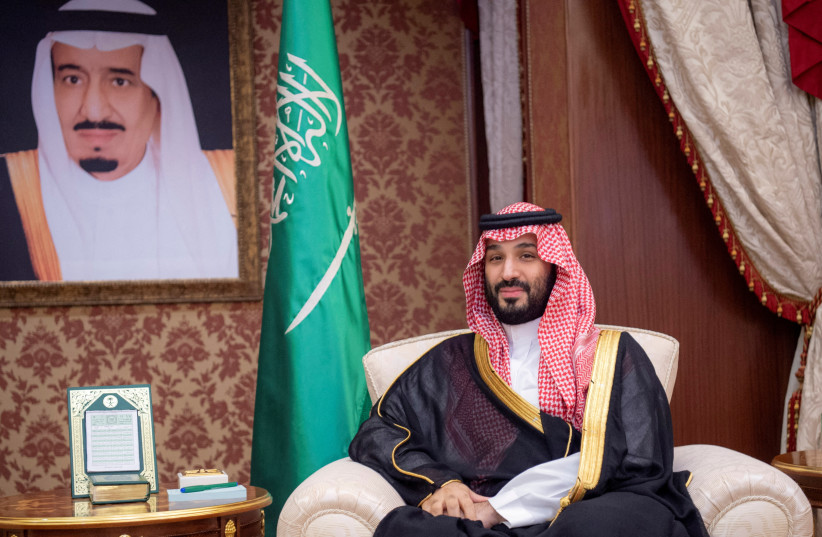Helping Saudi Arabia go nuclear won’t stop Iran from doing it too – opinion
Saudi Arabia wants the Biden administration to help it build nuclear power plants and enrich uranium, which could bring the kingdom to the brink of building bombs. This is the quid pro quo Crown Prince Mohammed bin Salman Al Saud (MBS) is demanding for normalizing relations with Israel. Biden officials, eager to get Saudi Arabia to recognize Israel, are now twisting every which way to get to a nuclear yes.
It’s a bad bribe.
Although few experts admit it, the harmful security implications of America backing Saudi uranium enrichment or plutonium reprocessing via China, MBS’s second choice for nuclear supplies, could easily dwarf any specific nuclear nonproliferation concern. Yes, enrichment and reprocessing could bring Saudi Arabia within weeks of a bomb. And if Washington offers Riyadh nuclear assistance permitting these nuclear activities, the UAE, Turkey, Egypt, South Korea, and Vietnam (all states in historic war zones and that currently have nuclear cooperation agreements with the United States) will demand the same.
Cons of US backing Saudi nuclear enrichment outweigh pros
Washington, DC diplomats, of course, will quietly note that these other states are different and that America’s diplomacy is sturdy, and nuanced enough, to keep them from getting what the Saudis might receive. Their unspoken point is that none of these states are offering to “bring peace” to their region, as Saudi recognition of Israel may. For this, they will whisper, nuclear risks should be run.
Putting aside how great those risks are, this diplomatic take ignores how states eager to get a bomb option can reverse this argument’s logic by making threats.
 Saudi Crown Prince Mohammed bin Salman, in Jeddah, Saudi Arabia, June 6, 2023 (credit: VIA REUTERS)
Saudi Crown Prince Mohammed bin Salman, in Jeddah, Saudi Arabia, June 6, 2023 (credit: VIA REUTERS)MBS, in fact, is already playing this hand, threatening to get his nuclear help from China, to join China’s economic orbit (BRICS), to sell off Saudi holdings of US Treasury bonds, and to cut back on oil production.
If Biden caves to MBS’s nuclear demands, South Korea (a mutual security treaty ally) and Turkey (a NATO member) will wonder why they don’t deserve similar treatment. The UAE, whose nuclear cooperation agreement with the United States stipulates that Washington must reopen nuclear consultations if it affords more generous nuclear deals with any of the UAE’s neighbors, will also want “adjustments.” Egypt, America’s second-largest recipient of foreign military assistance, is certain to want the same – and all will be more than willing to extort Washington to get their way.
Have President Joe Biden and Prime Minister Benjamin Netanyahu and their people thought through what these threats might be?
Caught up in the immediate, their focus is elsewhere.
Instead, Biden’s National Security Advisor Jake Sullivan has asked the International Atomic Energy Agency (IAEA) for its “opinion on a possible civilian nuclear program in Saudi Arabia that includes uranium enrichment.” The IAEA is unlikely to disapprove. After all, the agency claims it can safeguard uranium enrichment and plutonium reprocessing against military diversions in Japan, Brazil, Argentina, and Iran.
But that’s a stretch. IAEA inspections are supposed to deter bad actors by reliably detecting military diversions before any flinched materials might be fashioned into a bomb. Yet, historically, IAEA detections have come just before, or even after, the diversion – hardly soon enough to mount any effective international response.
Embarrassing past nuclear-inspections lapses demonstrate that even the best monitoring of nuclear-fuel-making activities can’t afford timely warning – time sufficient for outside authorities (the IAEA or other states) to intervene to prevent bombs from being built. Nor should we expect our intelligence agencies to sound the tocsin.
In 1988 and 2007, the United States discovered that the Saudis had imported Chinese nuclear-capable missiles; and in 2021, that Riyadh was building a Chinese missile factory. Yet, in each case, our intelligence agencies only found out after the missiles and factories were in place – too late to prevent their acquisition. A similar belated surprise came in 2020 when US intelligence discovered China was secretly helping Saudi Arabia process uranium.
This, then brings us to an even more disturbing point.
If MBS is true to his promise to follow Iran’s nuclear lead, any nuclear power program, even one that excludes enrichment or reprocessing, will serve as a covert nuclear weapons technology conduit.
Iran used their “safeguarded” Bushier power project as a phony acquisition and training platform for this purpose. This is something our intelligence agencies belatedly confirmed in a detailed, highly classified analysis. (An unclassified version by the intelligence community’s lead analyst is available to the public.) What the Mullahs pulled off, MBS is fully capable of.
Bottom line: Unless sun-soaked, natural gas-rich Saudi Arabia has a truly compelling economic reason to develop civilian nuclear energy (and it doesn’t), Washington should stay clear of helping it do so.
Yes, Iran’s nuclear program certainly is a worry; it needs to be rolled back.
But that’s not something that helping the Saudis go nuclear will accomplish – just the reverse.
The writer is executive director of the Nonproliferation Policy Education Center in Arlington, Virginia. He served as deputy for nonproliferation policy in the US Defense Department (1989-93), and is the author of Underestimated: Our Not So Peaceful Nuclear Future (2019).





Comments are closed.